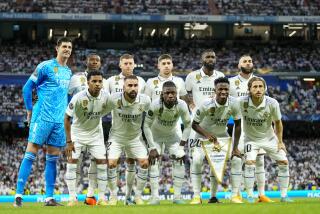European Champions League final comes at too high a price
- Share via
Michel Platini did not have the backbone to stand up and denounce those who have shamelessly ripped off the real soccer fans. All he could offer was a meek apology.
But you can bet your entire collection of Lionel Messi-autographed jerseys that the French president of UEFA will have the best seat in the house at Wembley Stadium come Saturday night.
Or perhaps it will be the second-best seat. After all, Platini might have to defer to Switzerland’s Joseph “Sepp” Blatter, the president of FIFA.
Once Blatter, 75, is called to that great public relations meeting in the sky amid a cacophony of Swiss Alpine horns and much hand-wringing by his army of international sycophants, Platini, 55, will be favored to step into his size nines.
But Platini was helpless when it came to the ticket prices that his own organization opted to impose for Saturday’s Barcelona versus Manchester United European Champions League final in London.
So fans were forced to pay twice as much as they did only two years ago in Rome, when the final also featured Manchester United against Barcelona, and the Catalans won, 2-0.
The cheapest seat at Wembley? It’s $171 if you happen to use a wheelchair. Otherwise it’s $284, rising to $7,562 for the wine-sniffers and canapé-nibblers in the corporate suites.
(Granted, the “cheapest” seats are a fraction of Super Bowl prices, but in Europe complaints have been long and loud by many fans.)
“We now receive 200,000 requests for these tickets, and now on the black market it’s 10 times the price that we decide,” Platini said at the time of his meaningless apology.
Indeed, Champions League tickets were being touted on the Internet this week at close to $7,000 apiece.
Instead of bemoaning all this, Platini needs to figure out a way of foiling the scalpers while allowing fans who don’t have a limousine and chauffeur to attend their team’s most meaningful game of the year.
And it is as meaningful as any bit of sporting silverware can be.
If the English team wins, the rabid English tabloids will go into a flag-waving frenzy, predicting victory for England in the 2012 European Championship and, after that, probably even in the 2014 World Cup.
They will conveniently forget, however, that Manchester United has a Scottish coach and that its roster includes a Dutchman, a Mexican, a Pole, a Serb, two Frenchmen, a Portuguese, a Scot, a Bulgarian, a Welshman, three Irishmen, three Brazilians, a Korean, an Ecuadorean, an Italian and a Canadian.
Oh, yes, and eight Englishman, only four of them regular starters. It’s not an English team. It’s a soccer team.
On the other hand, if the Catalan team wins — and especially if it does so in style — it will rightly have to be ranked among the greatest ever, and its players might even be hailed in say, Madrid, which also has a useful team that now and again wins this thing.
In short, opportunity knocks, as Josep “Pep” Guardiola, Barcelona’s coach, recently noted.
“We have to be conscious of the fact that although we have played in two finals in the last three years, we could go another 20 years without making it to another,” he said.
Not really. Just listen to Barcelona’s playmaker extraordinaire, Xavi: “This is our third final in six years. For us this is historic. There are 10 or 15 teams who can win the Champions League any season, so to reach the final again is fantastic.”
Xavi is being generous. The same 10 teams from the same six countries are virtually always in the running for the trophy with the “big ears.”
The statistics since the European Cup, as it was previously known, was launched in 1955 tell the tale:
• Italian clubs have won it 12 times and been runner-up 14 times, led by AC Milan (seven/four) and Inter Milan (three/two) and Juventus (two/five).
• Spanish clubs have won it 12 times and been runner-up nine times, led by Real Madrid (nine/three) and Barcelona (three/three).
• English clubs have won it 11 times and been runner-up six times, led by Liverpool (five/two) and Manchester United (three/one).
• German clubs have won it six times and been runner-up eight times, led by Bayern Munich (four/four).
• Dutch clubs have won it six times and been runner-up twice, led by Ajax Amsterdam (four/two).
• Portuguese clubs have won it four times and been runner-up five times, led by Benfica (two/five).
Those 10 named clubs, in other words, have won 42 of the 55 editions of the tournament. Only three times in the past 20 years has a club outside that exclusive 10 emerged victorious — Red Star Belgrade in 1991, Olympique Marseille in 1993 and FC Porto in 2004.
Even more pointedly, every final but one in the history of the competition has featured a club from one of the six named countries.
No matter which team wins Saturday night — one hopes for Barcelona but suspects it will be Manchester United — those traditions will continue.






